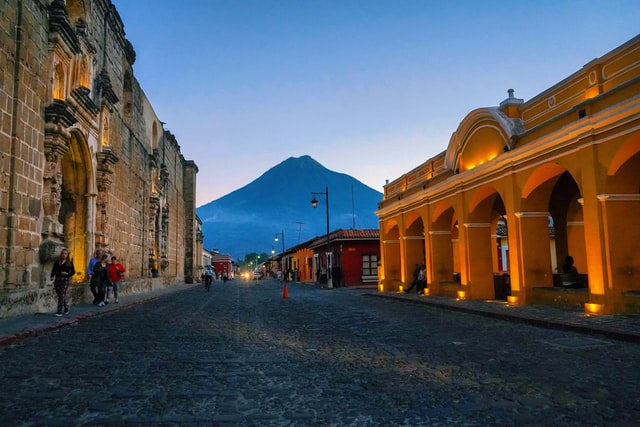Coping with Catcalling: 4 Tips for Latin American Travels

 “… a woman’s beauty does not belong to her alone. It is a part of the bounty she brings into the world. She has a duty to share it.”
“… a woman’s beauty does not belong to her alone. It is a part of the bounty she brings into the world. She has a duty to share it.”
Swinging gently in a hammock on a warm El Salvador morning in Playa el Tunco, I read over these sentences several times. I picked up the book, Disgrace, by J. M. Coetzee, in the hostel book exchange. “She has a duty to share it.” The line is spoken by a romantic poetry professor as he attempts to seduce one of his students. After dealing with so much catcalling lately, I can’t help but disagree.
The issue of street harassment and catcalling in Latin America (and many other parts of the world) is an interesting one. I often argue with myself internally about it. It isn’t black and white. On one hand, says my more passive side, I am a visitor in this country. It is not my place to judge parts of Latin American culture that, as a visitor, I do not fully understand, and machismo is certainly part of this culture. On the other hand, argues my feminist side, just because it’s a part of the culture doesn’t make it right. I am not a piece of meat! I have the right to walk down the street without being propositioned every few blocks.
As a foreign woman walking down the street alone, or even with women traveling together, one gets plenty of attention. It can be anything from benign to intimidating, varying from harmless calls of “hola” or “hola, linda (pretty),” to blatant staring, to kissing noises, to proclamations of love, to stranger, more uncomfortable encounters.
What bothers me the most is that if the same woman walks down the street with any number of men accompanying her, everything changes.
A few weeks ago in Antigua, Guatemala, a female friend and I were waiting for a few people outside a busy market. A man with a blanket around his shoulders approached and proceeded to tell us that he could sell each of us for $100,000. If we decided to take him up on it, he said, he would be begging down the street all day. We ignored him, and laughed it off afterward, but I couldn’t help but think how alarming it might have been if the encounter had taken place anywhere other than on a busy street in the middle of the day.
Later that day, I walked past a young man distributing flyers for Spanish classes. “You want some Spanish?” He asked halfheartedly. I shook my head, and walked by. “You want some weed?” he asked with a little more purpose, and then, as I continued on my way, “You want some sex?” As though he really had me figured out.
What bothers me the most is that if the same woman walks down the street with any number of men accompanying her, everything changes. She won’t hear a peep from those who would normally be catcalling. It is as though a woman walking alone is unclaimed, unspoken for, and therefore fair game. I resent this. I feel strongly that I have no need or obligation to belong to anyone. However, it won’t do anyone any good to walk around feeling resentful all the time, so I’ve come up with some tips for dealing with catcalling and other unwanted male attention.
Coping with Catcalling: 4 Tips for Latin American Travels
1. Don’t take catcalling personally.
I have found, as have other female travelers I’ve spoken to, that catcalling occurs when men can tell that you are from another country. I get exactly the same amount of attention whether I am dressed for a night out, for the beach, or just coming off of a long, sweaty bus ride, weighed down by numerous backpacks and bags, with my dirty hair in a bun on top of my head.
2. Ignore it.
The best response to unwanted catcalling is none at all. Stare straight ahead and keep walking, as if you didn’t hear anything. Making eye contact or engaging at all tends to be seen as encouragement. When I’m not in the mood to be pestered, I walk like I have somewhere to be and I know exactly where it is, even if I don’t. I look ahead and don’t smile. I’ve also found that, for me personally, sunglasses help me look less approachable and feel less vulnerable.
3. Dress for the context.
Keep in mind where you are. While I have found that clothes don’t make a huge difference to the amount of attention one receives, it is true that the more you stand out, the more of a target you’re likely to be. Take Guatemala, for example. Many Guatemalan women wear traditional clothing, long skirts and blouses, but plenty of local girls wear leggings, short shorts and sleeveless tops. You can’t expect clothing to camouflage you into the local crowd, but it helps to pay attention to what everyone else is wearing. You don’t want to be the only pair of bare legs in a sea of long skirts.
In beach towns and places where there are a lot of tourists, everyone tends to dress less conservatively. In both cities and remote, less touristy places, it is generally wiser to wear long pants and cover up a bit more.
Coping with Catcalling: 4 Tips for Latin American Travels.
4. Keep an open mind.
Don’t let yourself get too resentful. While catcalling is annoying, it is ingrained in Latin American culture, and it is a behavior that is learned at a very young age. I always try to remember that I am a visitor here. I don’t have to agree with everything, but I do my best not to be too judgmental.
Keeping those four rules in mind, I go about my travels, sometimes traveling alone, sometimes not. But, there’s one thing I know I won’t change my mind about: a woman’s beauty belongs to her, to do with as she pleases. She has no duty to share it with anyone.
Coping with Catcalling: 4 Tips for Latin American Travels photo by Unsplash.









“Later that day, I walked past a young man distributing flyers for Spanish classes. “You want some Spanish?” He asked halfheartedly. I shook my head, and walked by. “You want some weed?” he asked with a little more purpose, and then, as I continued on my way, “You want some sex?” As though he really had me figured out.”
Thank you for sharing your stories, Celia, in particular this one. It allowed me to take a step back and realize the lengths that someone will go to to try to make any money at all.
I will be heading to Guatemala and Nicaragua for some months, so it was nice to have this reminder as a solo female traveler.
Let me add another level of frustration. When I walk down the street with my wife (lesbian couple) in various countries in Latin America, they do not drop their solicitations, even though she holds my hand and by my appearance and ours together it’s clear we are a couple.
We also tried to ignore it as much as possible, but the glares, kisses, and aggressive behavior gets old. I’d say it’s my least favorite part about a culture I love.
That must be extremely frustrating! LGBT rights are another issue deeply affected by the machismo culture in Latin America, in addition, I think, to religion. Definitely needing to be addressed.
Thanks for writing this! My 11-year old daughter and I live in Nicaragua, and while I was somewhat ready to be catcalled myself when we moved here, it was a shocker to see it happen to her, at such a young age. I wrote this post about it if you’re interested in hearing more about how she (and I) deal with it.
http://nicolevulcan.blogspot.com/2014/11/when-your-tween-gets-catcalled.html
Great post!
Thank you nico! I can only imagine how strange and unsettling it must be to hear about your daughter getting harassed. I thought your article was very well done. The first time I really experienced street harassment was in Italy with my family when I was 15 (quite a bit older than 11!) It made me uncomfortable but I think it bothers me more now that I understand the full connotations.
Thanks for checking out the post! It is unsettling for sure…
Good article on an important topic. I mostly agree with these points. But while it’s true that you get more attention if people can tell you’re foreign, local women still get harassed. This was a common topic of discussion with me and my Peruvian Spanish teacher during my time in Peru. And on the flip side, I get harassed at home in the States (though admittedly not with the frequency as in Peru). I also have been harassed while with men. In Peru, once I was catcalled while walking down the street holding my boyfriend’s hand! Just the other day in the States, I got catcalled while walking down the street with my male boss. All this to say that catcalling/harassment occurs all over in all types of situations, unfortunately.
I totally agree with your last sentence – a woman has no obligation to share her beauty with anyone. I think it is tied up in “culture” inasmuch that most cultures are patriarchal. And like you said, just because it is part of culture (however “culture” is defined) doesn’t make it right, especially if it is hurting others!
Thanks Leah!
I am aware that local women get harassed as well. I did not mean to exclude them, and wish I had addressed that more. And of course being accompanied by men doesn’t always end shut off harassment completely, but I have noticed a significant and dramatic difference.